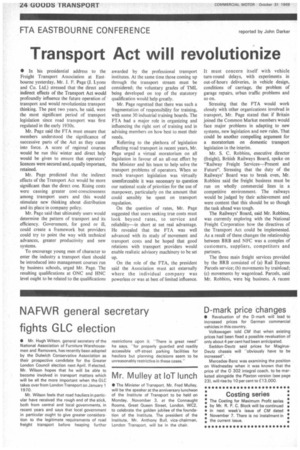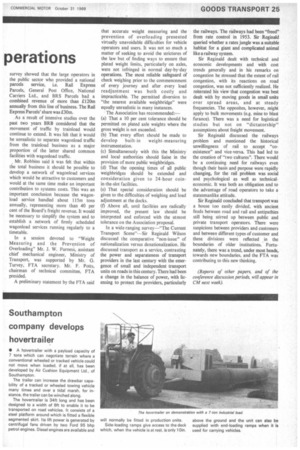Transport Act will revolutionize perations
Page 26

Page 27

If you've noticed an error in this article please click here to report it so we can fix it.
• In his presidential address to the Freight Transport Association at Eastbourne yesterday, Mr. J. F. Page (J. Lyons and Co. Ltd.) stressed that • the direct and indirect effects of the Transport Act would profoundly influence the future operation of transport and would revolutionize transport thinking. The past two years, he said, were the most significant period of transport legislation since road transport was first regulated in the early 1930s.
Mr. Page said the FTA must ensure that members understood the significance of successive parts of the Act as they came into force. A score of regional courses would be run this' winter and direct help would be given to ensure that operators' licences were secured and, equally important, retained.
Mr. Page predicted that the indirect effects of the Transport Act would be more significant than the direct one. Rising costs were causing greater cost-consciousness among transport users and this would stimulate new thinking about distribution and its place in company policy.
Mr. Page said that ultimately users would determine the pattern of transport and its efficiency. Government, for good or ill, could create a framework but providers could try to point the way with technical advances, greater productivity and new systems.
To encourage young men of character to enter the industry a transport slant should be introduced into management courses run by business schools, urged Mr. Page. The resulting qualifications at ONC and HNC level ought to be related to the qualifications awarded by the professional transport institutes. At the same time those coming up through the transport stream must be considered; the voluntary grades of TML being developed on top of the statutory qualification would help greatly.
Mr. Page regretted that there was such a fragmentation of responsibility for training, with some 30 industrial training boards. The FTA had a major role in organizing and influencing the right sort of training and in advising members on how best to meet their needs.
Referring to the plethora of legislation affecting road transport in recent years, Mr. Page urged a virtual moratorium on all legislation in favour of an all-out effort by the Minister and his team to help solve the transport problems of operators. When so much transport legislation was virtually unenforceable it was necessary to question our national scale of priorities for the use of manpower, particularly on the amount that could sensibly be spent on transport regulation.
On the question of rates, Mr. Page suggested that users seeking true costs must look beyond rates, to service and reliability—in short at net real advantage. He revealed that the FTA was well advanced with its study of movement and transport costs and he hoped that good relations with transport providers would enable realistic advisory machinery to be set up.
On the role of the FTA, the president said the Association must act externally where the individual company was powerless or was at best of limited influence.
It must concern itself with vehicle turn-round delays, with experiments in out-of-hours deliveries, in vehicle design, conditions of carriage, the problem of garage repairs, urban traffic problems and so on.
Stressing that the FTA would work closely with other organizations involved in transport, Mr. Page stated that if Britain joined the Common Market members would face major problems in adapting to new systems, new legislation and new rules. That could be another compelling argument for a moratorium on domestic transport legislation in the interim.
Mr. S. C. Robbins, executive director (freight), British Railways Board, spoke on "Railway Freight Services—Present and Future". Stressing that the duty of the Railways' Board was to break even, Mr. Robbins said the freight business must be run on wholly commercial lines in a competitive environment. The railways would be judged by their achievement and were content that this should be so though the task ahead was tough.
The Railways' Board, said Mr. Robbins, was currently exploring with the National Freight Corporation how the directives of the Transport Act could be implemented. As a result of these changes the relationship between BRB and NFC was a complex of customers, suppliers, competitors and partners.
The three main freight services provided by the BRB consisted of (a) Rail Express Parcels service; (b) movements by trainload; (c) movements by wagonload. Parcels, said Mr. Robbins, were big business. A recent survey showed that the large operators in the public sector who provided a national parcels service, i.e. Rail Express Parcels, General Post Office, National Carriers Ltd., and BRS Parcels had a combined revenue of more than .£120m annually from this line of business. The Rail Express Parcels' share was £30m.
As a result of intensive studies over the past two years BRB considered that the movement of traffic by trainload would continue to extend. It was felt that it would be unrealistic to separate wagonload traffic from the trainload business as a major proportion of the latter shared common facilities with wagonload traffic.
Mr. Robbins said it was felt that within the total business it should be possible to develop a network of wagonload services which would be attractive to customers and would at the same time make an important contribution to systems costs. This was an important conclusion because the wagonload service handled about 115m tons annually, representing more than 40 per cent of the Board's freight revenue. It would be necessary to simplify the system and to establish a network of firmly scheduled wagonload services running regularly to a timetable.
In a session devoted to "Weight Measuring and the Prevention of Overloading" Mr. J. W. Furness, assistant chief mechanical engineer, Ministry of Transport, was supported by Mr. G. Turvey, FTA secretary. Mr. F. Potts, chairman of technical committee, FTA presided.
A preliminary statement by the FTA said that accurate weight measuring and the prevention of overloading presented virtually unavoidable difficulties for vehicle operators and users. It was not so much a matter of seeking to avoid the strictures of the law but of finding ways to ensure that plated weight limits, particularly on axles, were not infringed in normal day-by.day operations. The most reliable safeguard of check weighing prior to the commencement of every journey and after every load readjustment was both costly and impracticable. The permitted diversion to "the nearest available weighbridge" were equally unrealistic in many instances.
The Association has recommended:—
(a) That a 10 per cent tolerance should be permitted on plated axle weights where the gross weight is not exceeded.
(b) That every effort should be made to develop built-in weight-measuring instrumentation.
(c) Simultaneously with this the Ministry and local authorities should liaise in the provision of more public weighbridges.
(d) That the opening times of all public weighbridges should be extended and consideration given to 24-hour coinin-the-slot facilities.
(e) That special consideration should be given to the difficulties of weighing and load adjustment at the docks.
(f) Above all, until facilities are radically improved, the present law should be interpreted and enforced with the utmost tolerance on the Association proposal.
In a wide-ranging survey—"The Current Transport Scene"—Sir Reginald Wilson discussed the comparative "non-issue" of nationalization versus denationalization. He discussed transport as a service, contrasting the power and separateness of transport providers in the last century with the emergence of small and independent transport units on roads in this century. There had been a change in the balance of power, with licensing to protect the providers, particularly the railways. The railways had been "freed" from rate control in 1953. Sir Reginald queried whether a rates jungle was a suitable habitat for a giant and complicated animal like a railway system.
Sir Reginald dealt with technical and economic developments and with cost trends generally and in his remarks on congestion he stressed that the extent of rail congestion, with its reactions on road congestion, was not sufficiently realized. He reiterated his view that congestion was best dealt with by moving goods in small units over spread areas, and at steady frequencies. The opposites, however, might apply to bulk movements (e.g. mine to blast furance). There was a need for logistical studies but not on "dictatorship" assumptions about freight movement.
Sir Reginald discussed the railways problem and mentioned the historical unwillingness of rail to accept "coexistence" and vice-versa. This had led to the creation of "two cultures". There would be a continuing need for railways even though their basis and purpose were rapidly changing, for the rail problem was social and psychological as well as technicaleconomic. It was both an obligation and to the advantage of road operators to take a statesmanlike attitude.
Sir Reginald concluded that transport was a house too easily divided, with ancient feuds between road and rail and antipathies still being stirred up between public and private transport operators. There were suspicions between providers and customers and between different types of customer and these divisions were reflected in the boundaries of older institutions. Fortunately, there was a trend, under most heads, towards new boundaries, and the FTA was contributing to this new thinking.


























































































































